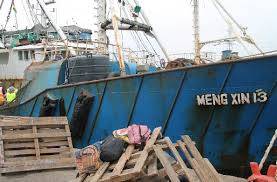Ghana Navy Investigates Suspected Pirate Attack, Three Crew Members Feared Kidnapped
The Ghana Navy initiated an investigation into a suspected pirate attack of a Ghana-registered fishing vessel, MENGXIN 1, in the waters of Ghana on the evening of March 27, 2025. The attack has left three Chinese crew members missing and are thought to have been kidnapped by the armed pirates who boarded the ship.
Details of the Attack
Seven gunmen overboarded the fishing vessel around 5:53 PM local time, it reports. The marauders launched warning shots aboard the ship and caused a stampede by the crew members as they jumped into the boat, eyewitnesses have reported. As revenge, most of the crew members abandoned the vessel and rushed to safer regions of the boat as pirates hijacked.
The intruders stayed on board for about three hours, stealing valuables and pillaging the ship. When they left, the crew emerged from their hiding places only to realize that three of the most crucial crew members—the Captain, Chief Mate, and Chief Engineer, all Chinese nationals—had vanished. The pirates also stole mobile phones from part of the crew, thus cutting instant communications with the authorities.
Following the attack, the vessel continued to Tema Fishing Harbour, where it was safely berthed. The remaining crew members, though physically unharmed, were visibly traumatized. Ghana's Marine Police and Naval Intelligence quickly moved in to launch a full-scale inquiry into the attack.
Ghana Navy's Response and Investigations
The Ghana Navy, in cooperation with national security organizations, has classified the attack as a possible case of kidnapping and piracy. Intelligence organizations have begun monitoring the suspected whereabouts of the missing crew members while analyzing the modus operandi used by the perpetrators. The government has also notified neighboring coastal states via the ECOWAS Multinational Maritime Coordination Centre (MMCC) Zone F, located in Accra.
This coordination forms part of the broader Yaoundé Architecture, a regional security architecture to combat piracy in the Gulf of Guinea. Since the incident is global in nature, Ghanaian authorities will most likely work with global security partners in a bid to pursue the criminals and facilitate safe rescue of the kidnapped crew members.
Piracy in the Gulf of Guinea: A Growing Concern
Despite the fact that Ghana's waters have always been regarded as safer than others in the Gulf of Guinea, the attack underscores the prevailing maritime security challenges in the region. The Gulf of Guinea has over the past few years emerged as one of the most unstable maritime areas in the world with frequent piracy incidents, armed robbery of vessels at sea, and kidnappings for ransom of fishermen, cargo vessels, and oil tankers.
Over the past decade, countries of West Africa have implemented several counter-piracy strategies, including joint naval patrols, exchange of information, and international collaboration. Nevertheless, the vast, often poorly controlled waters of the Gulf of Guinea still provide latitude for criminal syndicates to spread. The attack in recent days off the coast of Ghana might signal an extension of piracy efforts into previously fairly secure regions.
Implications for Security and Diplomacy
The reported kidnapping of three Chinese crewmen lends diplomatic undertones to the incident. China is among Ghana's key collaborators in its fishery business and general trade relations, and any harm inflicted on Chinese citizens would strain diplomatic relations. The Ghanaian government would likely initiate contact with Chinese authorities to ensure coordination of efforts towards safe release of the kidnapped individuals.
Besides the diplomatic arena, the attack also presents dangers to the fishing and maritime industries of Ghana. More pirate attacks would dissuade foreigners from investing in the sector and impact trade in the West African coast. Security for local and foreign mariners sailing through the waters of Ghana would also be an issue for concern, and demands for improved security would rise.
Steps Being Taken to Strengthen Maritime Security
After the attack, Ghanaian authorities will heighten security to prevent such attacks in the future. Some of the short-term measures that can be taken include:
1. Increased Naval Patrols: The Ghana Navy will heighten surveillance and patrol efforts across Ghanaian waters, particularly over regions where commercial shipping and fishing activities are most prevalent.
2. Intelligence Network Strengthening: Enhanced coordination among Ghana's security agencies and regional intelligence agencies could help track piracy rings and anticipate possible attacks.
3. Increased Vessel Monitoring Systems: Authorities can make sure that there is tighter control over vessel tracking, whereby ships that sail through Ghanaian waters should have real-time communication with security agencies.
4. International Cooperation: Due to the international humanitarian character of maritime crimes, Ghana may have more collaborations with international naval resources, such as the European Union, the United States, and China, in a bid to expand security initiatives.
The Way Forward
While the investigations are ongoing, Ghana's priority remains the safe rescue of the kidnapped crew members. The government has also assured the public and stakeholders that it will ensure that the perpetrators of the act are caught and prevented from staging future attacks. Ship operators, on their part, are being warned to be cautious and guided by security protocols at sea.
This latest attack is a sober reminder of the need for sustained vigilance and investment in maritime security. Although Ghana has made strides in its battle against piracy, incidents such as this serve to highlight the sustained challenges that the country and its regional partners face to make seas safer for all.




No comments yet
Be the first to share your thoughts!